Cancer continues to be a major leading cause of death in the world. Despite the significant advances in oncology, the incidence and mortality rates of cancer remain high. Therefore, the search for less toxic and more effective cancer treatment strategies is still at the forefront of current scientific research.
Curcumin, the active ingredient of turmeric, from the Curcuma longa plant, has received significant recognition over the past few decades as a potential anticancer agent.
When you are fighting late-stage and challenging cancer, it is essential to support your body in every way possible. Curcumin is one of many potential anticancer substances to help you fight cancer from every angle, in addition to your oncologist treatments.
What is Curcumin?
Turmeric is a yellow spice derived from the root of the Curcuma longa plant and is commonly used in cooking Asian foods. Turmeric contains the potent plant chemical curcumin, which is well-known for its anti-inflammatory and antioxidant activity [1].
The terms “turmeric” and “curcumin” are sometimes confused or used interchangeably. Turmeric is the yellow cooking spice, but the active ingredient responsible for most of its health benefits is curcumin.
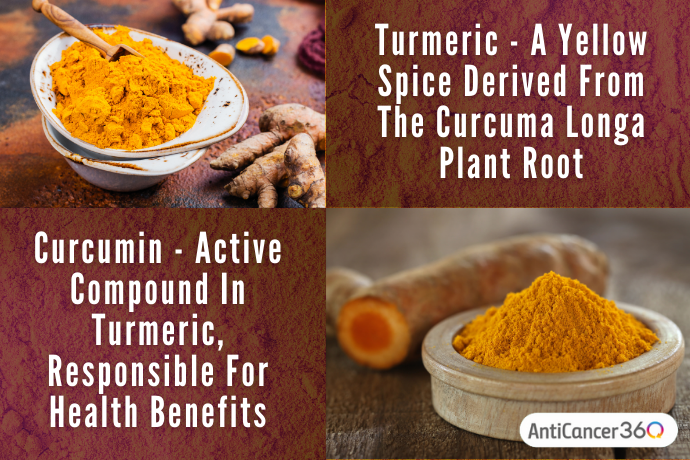
Curcumin, used for medicinal purposes since ancient times, has been extensively studied over the last few decades. Thousands of studies and hundreds of clinical trials have explored curcumin’s effectiveness as a potential treatment of many chronic diseases, such as diabetes, heart disease, immune system disease, mental illnesses, and cancer. Scientists have learned that curcumin has multiple molecular mechanisms contributing to its many effects, including antioxidant, anti-inflammatory, antimicrobial, and anticancer [2].
Laboratory research suggests that curcumin may prevent cancer, slow cancer growth, enhance chemotherapy’s effectiveness, and protect healthy cells from radiation therapy damage.
Cancer Metabolism Suppression: How to Starve Cancer with Curcumin
Cancer metabolism is the process by which cancer feeds itself with nutrients and makes energy for its survival. The exploration of how to starve cancer with drugs and natural supplements is a key cancer-fighting strategy.
In this sense, we aim to prevent sugar, fats, and proteins from nourishing cancer cells. This strategy weakens cancer cells, making them more vulnerable to cancer treatments. Many plant nutrients, including curcumin, have shown potential in blocking cancer metabolism.
Curcumin May Regulate Blood Sugar Levels and Suppress Glucose Related Cancer Metabolism
Curcumin has been extensively studied for its ability to lower blood glucose (sugar), potentially preventing the progression of prediabetes and type 2 diabetes.
Insulin is a hormone produced by the pancreas and is normally released into the bloodstream after consuming carbohydrates (sugar-containing foods). Insulin acts as a signal to the body’s cells, telling them to absorb the sugar, regulating the glucose level circulating in the blood.
In prediabetes, the body becomes resistant to the effects of insulin. This means your pancreas needs to produce more and more insulin to get the same impact. After years of overproduction, the insulin-producing cells in the pancreas can burn out.
Curcumin appears to lower blood sugar by improving insulin sensitivity. Insulin sensitivity describes how responsive your body’s cells are to insulin. High insulin sensitivity allows cells to utilize blood sugar more effectively, reducing blood sugar and preventing diabetes progression.
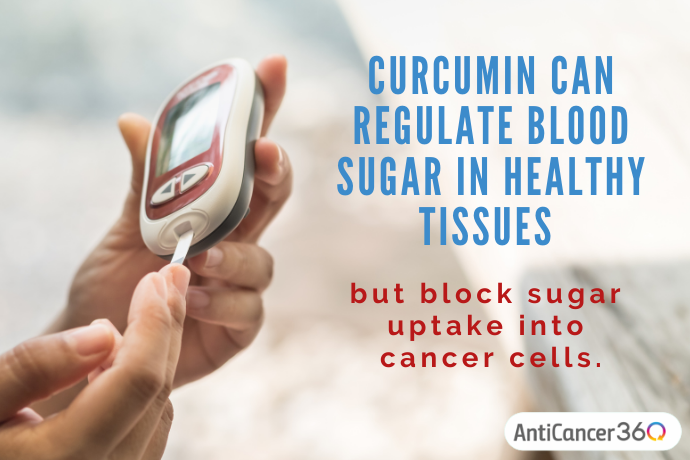
However, curcumin appears to have a paradoxical effect in its ability to lower blood sugar in healthy tissues, compared to its potential anticancer effects.
Tumor cells usually require higher levels of blood glucose uptake and metabolism to satisfy their high energy needs.
Researchers have observed that curcumin can inhibit (block) structures on the cell surface known as glucose transporters, such as GLUT1 and GLUT4. These glucose transporters are responsible for physically taking glucose out of the bloodstream and into the cell [2].
Due to their high demand for glucose, many cancer cells have an overabundance of GLUT1 glucose transporters. By the direct inhibition of GLUT1, curcumin potentially slows glucose uptake and compromises the cancer cell’s growth [2].
Curcumin May Disrupt Cancer Metabolism of Glutamine
Cancer cells are continually adapting, and they need sources of energy to survive. If cancer cells are starved of glucose, they can adjust and redirect to other energy sources like glutamine and fat.
Amino acids are the building blocks of proteins that have numerous essential cell functions. Glutamine is the most abundant amino acid in our bodies, and tumor cell growth demands high glutamine levels. Finding ways to interfere with cancer cells’ glutamine metabolism is a logical objective of cancer research.
Curcumin exhibits its unique anticancer activity by inducing apoptosis (programmed cell death) and inhibiting proliferation by suppressing various cellular signaling pathways [3]. Researchers have learned that curcumin may enact these anticancer activities by changing how cancer cells transport and process glutamine.
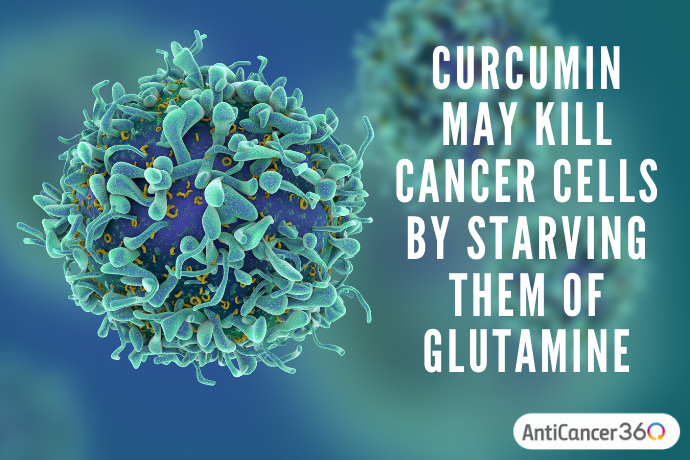
In a laboratory study of curcumin’s effects on colorectal cancer stem cells, researchers learned that curcumin might have some blocking effects on the transport of glutamine into the cells [4]. With decreased glutamine content in the colorectal cancer stem cells, the cancer cells could not perform essential functions, leading to cell death.
Curcumin also influences another glutamine-related metabolic pathway known as mTOR (mammalian target of rapamycin). mTOR is a growth-regulating enzyme recognized as a crucial link between the availability of nutrients and metabolic control.
Scientists have discovered that the mTOR cell-signaling pathway is hyper-activated during different cellular processes, such as tumor formation and insulin resistance, and becomes uncontrolled in cancer and type 2 diabetes. The role of mTOR in protein synthesis makes it essential for cancer cell survival. Thus, many cancer researchers are focused on strategies to minimize mTOR activity in tumor cells.
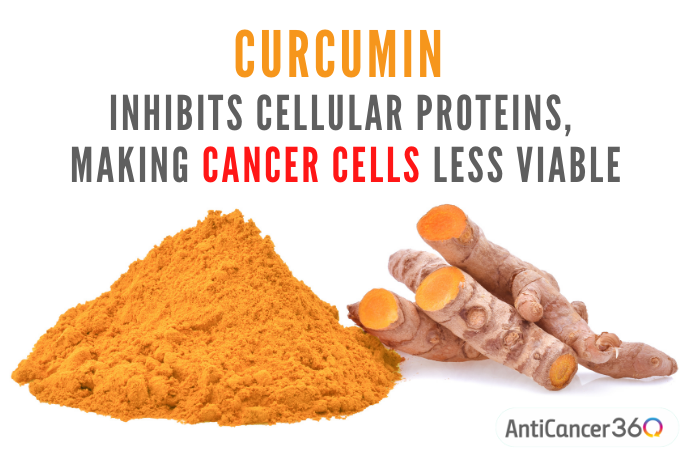
Curcumin, among other phytochemicals, may decrease mTOR activity.
Curcumin has been shown to inhibit mTOR signaling. By inhibiting mTOR signaling, the tumor cell cannot produce essential proteins that are crucial regulators for its metabolism, including pyruvate kinase M2 (PKM2). Without PKM2, sugar uptake and lactate production is inhibited. Ultimately, curcumin makes cancer cells less viable by blocking vital cellular proteins [5].
Aggressive Integrative Approach with Curcumin
Some researchers point out that the concentrations of curcumin obtained in laboratories are higher than what can be realistically absorbed in the human body. However, combining curcumin with other natural products may be a potential strategy to overcome its limited absorption. Further, integrating curcumin with other cancer treatments, like chemotherapy or radiation, may improve therapy outcomes.
Not only does curcumin have the ability to rewire cancer cell metabolism and modulate different cell signaling pathways without harming normal cells, but curcumin also serves as an effective chemosensitizer for other therapeutic drugs. This includes 5-fluorouracil (5-FU), doxorubicin, paclitaxel, cisplatin, and celecoxib [6].
Chemosensitizers are substances that enhance the therapeutic response to chemotherapy and potentially reduce resistance. Unfortunately, many cancer patients’ prognosis remains dismal because of the high rate of drug resistance encountered after initial chemotherapy treatments. Resistance occurs when cancers that have been previously responding to treatment suddenly begin to grow again.
Platinum-based chemotherapy drugs (cisplatin, carboplatin, oxaliplatin) are used to treat various types of cancers. However, their success is often limited by acquired resistance.
Laboratory researchers studying human colorectal cancer cells observed that more colorectal cancer cells died off when curcumin was added to platinum-based chemotherapy drugs. Curcumin produced synergistic effects with cisplatin and carboplatin and additive effects with oxaliplatin [7].
The synergistic and additive effects of curcumin seem to be related to its ability to reduce the activity of NF-κB. The activation of NF-κB can lead to treatment-induced tumor cell resistance. NF-κB (nuclear factor kappa light chain enhancer of activated B cells) is a family of enzymes that regulate many critical cellular processes, including inflammatory responses, cellular growth, and apoptosis.
Another study investigated the anticancer effects of curcumin combined with 5‑fluorouracil (5-FU) plus cisplatin on human gastric cancer cells. Following treatment with curcumin and/or 5‑FU plus cisplatin, gastric cancer cell viability was significantly reduced compared with the untreated control group [8].
In this study, the researchers determined that curcumin possibly enhanced the anticancer effects of the chemotherapy by promoting apoptosis (cell death) via interference in specific cancer cell signaling pathways, known as caspase‑3/caspase‑8, Bcl‑2, and Bax signaling pathways [8].
Pancreatic cancer is one of the most aggressive forms of cancer and frequently becomes highly resistant to conventional therapies. A recent laboratory study evaluated the impact of curcumin on radiation therapy’s effects on human pancreatic cancer cells. The researchers observed that the curcumin-treated pancreatic cancer cells had significantly improved response to radiation treatment in comparison to the cancer cells that were not exposed to curcumin [9].
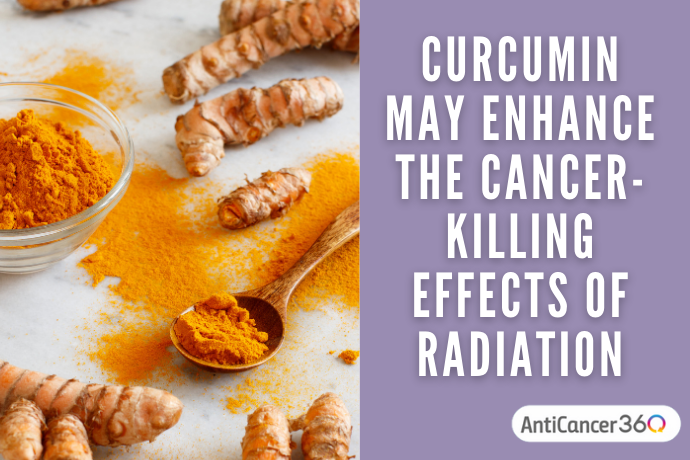
These scientists observed higher rates of cell-cycle arrest in curcumin-treated cancer cells that were previously resistant to radiation therapy. Cell-cycle arrest refers to a sudden halt in the stepwise processes that cells use to proliferate (genetic duplication and cell division).
These studies and many more support the potential for concurrent curcumin as a useful strategy for improving chemotherapy and radiation therapy outcomes.
How To Use Curcumin: Dosages, Side Effects, and Precautions
Dosage
By itself, curcumin is poorly absorbed. The most common strategy to address this problem is to pair curcumin with other substances that help enhance its absorption. Two common combinations are curcumin with piperine (a black pepper extract), or curcumin with lipids or other substances that are considered fat-soluble [1],[10].
The most common curcumin dosage with piperine is 500 mg of curcumin with 20 mg of piperine three times daily.
BCM-95®, a patented combination of curcumin and essential oils, has a recommended dosage of 500 mg twice a day.
Meriva®, a patented combination of curcumin and soy lecithin, has a recommended dosage of 200 to 500 mg twice a day.
Side Effects
Curcumin is generally well-tolerated and has a low risk of causing severe side effects.
Side effects are most common at high doses (over 8,000 mg per day) and may include stomach complaints such as nausea, diarrhea, constipation, and heartburn [1].
Drug and Supplement Interactions
Curcumin has the potential to interact with prescription drugs and other natural supplements.
Drugs or supplements that lower blood sugar may cause additive hypoglycemia with curcumin [1]. This means that blood sugar levels could drop too low. Some examples of blood-sugar-lowering drugs include metformin, glimepiride, and insulin. Some potential blood-sugar-lowering supplements include berberine, alpha-lipoic acid, and fenugreek.
This interaction risk can be managed with regular blood sugar monitoring, with glucose administration in case of hypoglycemia.
Anticoagulant or antiplatelet (blood-thinning) drugs, herbs, or supplements may increase bleeding with curcumin [1]. Some examples of blood-thinning medications include aspirin and warfarin, and some potentially blood-thinning supplements include danshen, fish oil, garlic, and ginkgo.
This interaction risk can be managed by combining curcumin and blood-thinning substances with caution, and monitoring signs of increased bleeding risk, like bruising and frequent nosebleeds.
Additionally, evidence from laboratory studies suggests that curcumin may bind with iron and prevent its absorption. Human studies have yet to confirm this, but it may be advised to monitor iron levels while taking curcumin supplements [1].
Curcumin may have other potential and unknown interactions with medicines and other natural supplements. This is not an exhaustive list of all potential interactions. You must consult with your doctor or pharmacist before including any supplements in your program.
However, adding a natural dietary supplement like curcumin can have many potential benefits in your overall anticancer program.
And ultimately, when using the “Aggressive Integrative Approach” to cancer, the goal is to fight cancer from every possible angle. This approach includes integrating natural supplements to fight cancer based on available evidence, despite limited human data, and to do it in a way that won’t interfere with your oncology treatments.
Please discuss the risk-versus-benefit potential with your healthcare professional before starting curcumin or any natural supplement.
Are You A Good Candidate For Our Program?
If you’d like to learn more about the AntiCancer360 approach and see if we can help you… either click here to schedule a free call so we can discuss your case in more detail, or watch our free online webinar to learn more about our approach.
Citations
Dr. Patricia Weiser is one of AntiCancer360’s consultant pharmacists, science advisors, and medical writers. Her expertise helps us create safe herbal and supplement combinations and avoid potential drug interactions.
Patricia is a graduate of the University of Pittsburgh and a licensed pharmacist. She has clinical experience in both community and hospital pharmacy. She is passionate about integrative and preventative care and strives to empower her patients to take an active role in their health.

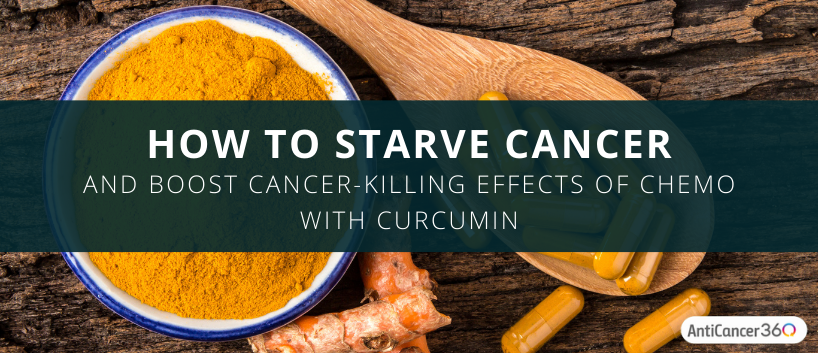



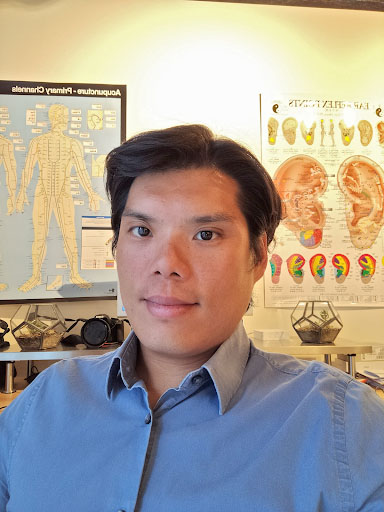
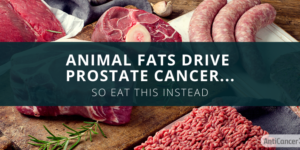

Do you know about neuroendocrine carcinoma tumors
Hi Michele!
This type of cancer is more rare… but yes, we have worked with cases like this in the past. And there are many pathways and mechanisms we can target for cases like this.
Have you had a chance to watch our online webinar by chance? If not, here’s the link below. There’s alot of information there that may be of benefit to you.
http://anticancer360.com/webinar
Best,
Gene Wei DOM, AP